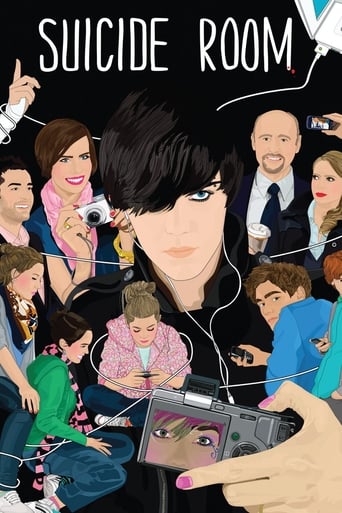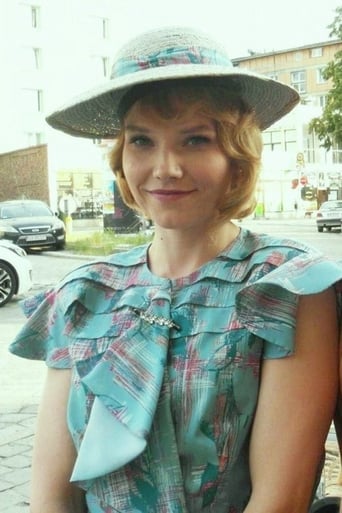Nicole Naimo
This movie is nothing but life changing to me. I have severe depression and I've had it for about a year and a half. Over time it got worse and worse. A couple months ago I started wanting nothing more than to die. I wanted to feel so much pain on the outside, so I didn't have to concentrate on the pain that goes on inside me in which my mind brings me. I didn't want to live in a world where there's so much evil, hatred, and betrayal, and who does? If you watch the news you see there's more and more murders, house fires, kidnappings, raping, bombings, terrorist attacks, etc. To our society, it's not uncommon anymore to hear about these things. Now we don't even feel devastated or torn apart every time we have to hear about these things occurring. But if it's happening to you, it's a whole different story. So many people only care about themselves and their family that they don't take the time or effort in helping others in need. If anyone sees this comment I want to tell you please think about how you treat and act towards others. This world needs a big change. Before I die I want to say that I've helped at least one person get out of depression. That's why this movie changed my life. I wanted to die because I didn't want to have to witness all of this evil and betrayal. Of course there were many other reasons why I wanted to end my life but that's not important right now. The point is this movie made me, and hopefully many others, realize that I don't really want to kill myself. There's so much more to life than you think. The way this movie changed me is incredible. I recommend that anyone with depression or thoughts of suicide watch this movie.
silverbillings
I want to write here first and foremost that I did check that this contains spoilers, so please please please don't read this if you haven't seen this amazing Polish masterpiece yet.As an agoraphobic and very suicidal young adult I could very much relate to this movie, it had me shaking and in tears within the first ten minutes. The way this story is written, following Domonik as he struggles with his sexuality and bullying, is just beautiful from every aspect. It opens your mind and isn't afraid to dig down deep into your emotions and pull them to the surface. The SADDEST part I found to this movie by far was the ending, not because of his suicide (yes, it was very sad) but the terms OF his suicide. I'll admit that I've done almost the exact same thing he did, I sat on my bed one night while my mom was gone at her BFs, drank a beer, and swallowed eight pill bottles worth of anti-depressants, anti-psychotics, and other miscellaneous prescriptions of mine. And I'll tell you that the last memory I have of that is literally chugging away the pills, I have no memory of anything from that night. So after Domonik had swallowed those pills sitting on the toilet, he would not have remembered those "funny drunk" moments he had, he wouldn't remember crying and begging for someone to call his parents. Hell, he wouldn't have even had that vision of going out and dancing with the pink haired girl. He would have died, with his last memory sitting on a dirty toilet, alone.
Arcadio Bolanos
Dominik has it all: a wealthy family, good looks, intelligence and a bright and promising future ahead of him. But why does he feel like he's losing his grip on all of it? Popularity seems to elude him, and although a few girls still want to dance with him in parties, he's slowly succumbing to shyness, struggling against minor aggressions from other students, against the seemingly harmless mockery of his peers.Adolescence is always difficult, hormonal changes and new feelings can destabilize anyone. Dominik finds himself exscinded, adrift between two possibilities: What does it mean to be manly? And what does it entail to act effeminately? Gender roles are not unwavering, as they change and evolve through times, through the actions of the people. Gendered behaviors are unnatural: the way in which we learn the performance of gender roles (what we commonly associate with femininity and masculinity) is an act of sorts, a performance, one that is imposed upon us by normative heterosexuality. We are like actors in a stage, trying to persuade others that we are either men or women: we do not follow our natural tendencies but rather the dictates of society.Everything in Dominik's life pertains to the norm; even his parents are ruled by it: they are like slaves following the orders of the marketing industry, in the case of the mother, and the government, in the case of the father. Yes, they have made a fortune, but in order to do so they have obeyed norms for so long that they can no longer feel free. It's this slavery that forces them to assume the heterosexual normativity to the extreme and have sex with anonymous lovers. They need a member of the opposite sex to enforce their roles as productive and successful heterosexual individuals.And that's what's expected of their son. And that's why he cannot reconcile his existential doubts with the demands of adulthood. In her book about Performativity, theorist Judith Butler asks herself to what extent our acts are determined for us, rather by our place within language and convention. For Butler, identity is an illusion retroactively created by our performances. She defines identity as "a compelling illusion, an object of belief" (not unlike Dominik's interpretation of Hamlet). Perhaps in past decades this was harder to understand, but now let's think about the internet and online communities in which we can recreate and reinvent ourselves. That's what Dominik finds in the "Suicide Room", a virtual environment, a rendezvous point for a group of strangers that rely on 'avatars' and online interaction.Although slightly insecure, Dominik is first presented as a 'normal' boy. Nevertheless, everything changes after a party in which two girls kiss each other and then challenge him to do the same with his friend Aleksander. The girls are not lesbians but they are subverting the foundations of heterosexual normativity. In the same way, the two boys kiss each other and personify for a few seconds the abject, id est, the homosexual condition. In order to have a heterosexual normativity there must be something that opposes to it.At the beginning, it would seem like this innocent kiss doesn't disturb anyone. Dominik's friends upload the kiss on YouTube but there are no hard reactions, no negative consequences. It's like a simple, childish joke. That is, until Dominik is wrestling with Aleksander during their judo lessons. Aleksander holds him down, and rubs his body against Dominik, this becomes so arousing for the teenager that he can't help but to ejaculate right there. Aleksander starts laughing about it and Dominik leaves the room instantly, completely humiliated and embarrassed.Aleksander, maliciously, tells everyone about the "semen incident" on Facebook, and the entire school starts laughing at Dominik. The boy is now under a lot of pressure and he cannot cope with it. That's when he finds a safe haven in the "Suicide Room". Let's remember that gender is completely a social construction, a fiction, and therefore open to change and contestation. In a way, this suicidal group is defying every convention; not only are they attempting to end their lives, but they are also computer generated images that have created an entire world online. This idea of identity as free-floating, as not attached to an 'essence', but instead to a performance, is part of the queer theory. And it's also fundamental in order to comprehend Jan Komasa's remarkable film. In the "Suicide Room" there is a Queen and warriors, and soon Dominik becomes a member of this club. Everyone here has, indeed, a floating, virtual identity. And gender rules don't really apply, as the Queen and Dominik have an intense friendship that can never turn into physical love.Just as it happened in the opening frames of the film, there are two parallel sequences: the ones in the real world, and the ones in this non-existent place created thanks to the internet. When Dominik tells his parents that he might be gay, they adamantly refuse to give credit to such possibility. As it has been established, they're so deeply embroiled in the heterosexual normativity that no other alternative can be valid for them. By illustrating the artificial, conventional, and historical nature of gender construction, Butler critiques the assumptions of normative heterosexuality: those punitive rules (social, familial, and legal) that force us to conform to hegemonic, heterosexual standards for identity.Unable to ascribe to predetermined gender roles, Dominik is now a tortured and fragile soul, vulnerable to the influence of this mysterious girl that acts like the Queen of the Suicide Room. But she along with her subjects are no more than phantasmatic projections devoid of any 'realness' or any sexual attributes for that matter. None of this matters to Dominik, who becomes more and more invested in this virtual world, neglecting reality and becoming completely isolated. A true masterpiece from Poland.






